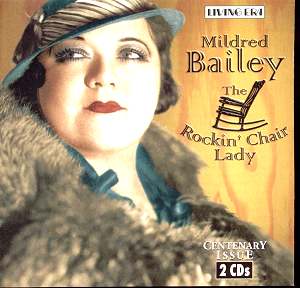All Of Me
At Sundown
Begin The Beguine
Bob White, Watcha Gonna Swing Tonight?
Darn That Dream
Don't Be That Way
Don't Take Your Love From Me
Downhearted Blues
Georgia On My Mind
Gulf Coast Blues
Harlem Lullaby
Have You Forgotten So Soon?
Heat Wave
Honeysuckle Rose
I Let A Song Go Out Of My Heart
It's The Natural Thing To Do
I've Got My Love To Keep Me Warm
Junk Man
Lazy Bones
Lonesome Road
Lover, Come Back To Me
Me And The Blues
Moon Got In My Eyes
More Than You Know
My Melancholy Baby
My Reverie
Never In A Million Years
Ol' Pappy
Old Folks
Peace, Brother!
Please Be Kind
Porter's Love Song To A Chambermaid
Prisoner Of Love
Rockin Chair
Says My Heart
Small Fry
Smoke Dream
So Help Me If I Don't Love You
Someday, Sweetheart
Squeeze Me
St Louis Blues
'Taint What You Do
It's The Way That Cha Do It
Thanks For The Memory
There's A Lull In My Life
Trust In Me
Weekend Of A Private Secretary
What Kind O' Man Is You?
When It's Sleepy Time Down South
Where Are You?
Willow Tree
Mildred Bailey (vocals)
with her Orchestra, Eddie Lang and his Orchestra,
Benny Goodman and his Orchestra, Glen Gray
and his Casa Loma Orchestra, Red Norvo and
his Orchestra, Matty Malneck and his Orchestra,
Paul Whiteman and his Orchestra
Mildred Bailey seemed to
fall somewhere between those two critical
commonplaces – taken for granted and underestimated.
But increasingly her status has risen. Her
repertoire was wide. She sang the Classic
Blues number Gulf Coast Blues in a
small band with Mary Lou William and Floyd
Smith in 1939. Earlier she’d essayed the Lovie
Austin-Alberta Hunter Downhearted Blues
alongside Bunny Berigan and Johnny Hodges,
both virtuoso instrumentalists whose baroque
flourishes are here necessarily reined in.
These echoes of Bessie Smith and Ethel Waters
marked her as an individualist amongst white
singers – an archivist, in a sense, of a different
tradition, or to be more accurate one who
idiomatically absorbed such "Race"
material into her own repertoire. The mementoes
of the South are also pervasive – Georgia
On My Mind and When it’s Sleepytime
Down South – both hot off the press when
Bailey recorded them. If Ray Charles and Louis
have now eclipsed her in popular memory in
these songs let’s never recall who was there
first – or how adeptly she fashioned the lyrics.
She sang with some stellar
players and the small group line-ups are not
at all dissimilar to those that John Hammond
prepared for Billie Holiday. Alongside Berigan
and Hodges we find the pivotal figure of Teddy
Wilson in that 1935 Parlophone session – the
so-called Alley Cats band - one of the single
best vocal sessions of the thirties. Moments
of magic abound. Try Andy Secrest’s Bix-saturated
solo on What Kind O' Man Is You? or
Coleman Hawkins’s Vorticist take on Ol'
Pappy.
One of the good things about
so many of her discs is the opportunity to
hear verses and not just choruses – to Georgia
for one and The Lonesome Road for another,
songs that are usually topped and tailed for
the convenience of tighter arrangements. Still,
there are some surprises. One doesn’t associate
her much with fey songs but My Reverie
is an Eddie Sauter and Larry Clinton arrangement
of an early Debussy piano piece – unusual
stuff indeed. So too is Mitch Miller’s oboe
interlude in Don't Take Your Love From
Me. Sauter incidentally provides the
suave arrangement for St Louis Blues
where Bailey is backed by her then husband
Red Norvo and a contingent from the John Kirby
band. Living Era has a bit of a track record
for ending with syrup – they’ve just released
an André Previn disc similarly afflicted
– and they do so again with the string-laden
confection All of Me abetted by Julian
Work and his orchestra.
This however is not representative
at all of the best sides here – excellently
and inventively arranged and with Bailey’s
cool, clear voice modifying from a rather
portamento-fluid and high affair to a highly
personalised, artifice-free and effortlessly
swinging one. One final thing; Digby Fairweather
can’t agree with himself as to when Bailey
was born; 1903 or 1907. He’s clearly been
handed a typo. It was 1907 making this, as
he notes, her centenary year. Two packed CDs
here, well transferred by Martin Haskell -
except for the dim and dusty first track -
handle her legacy with commitment.
Jonathan Woolf
